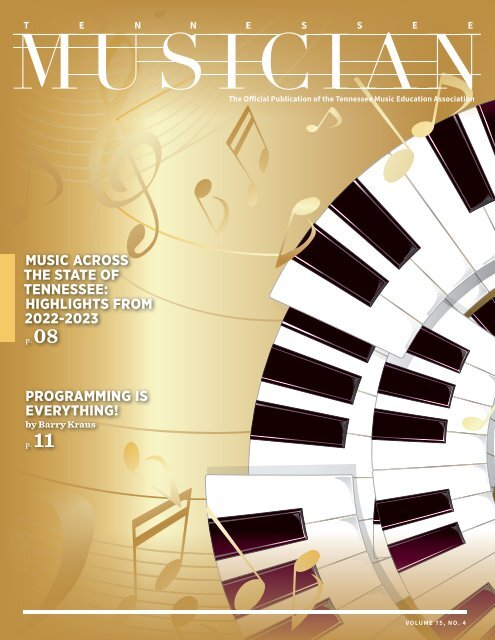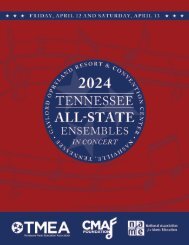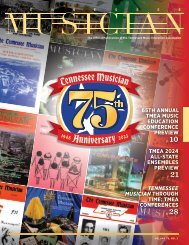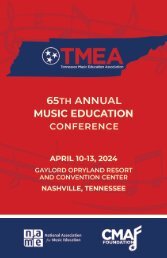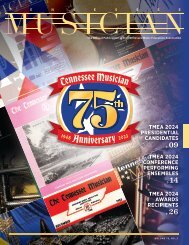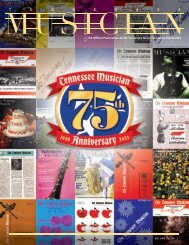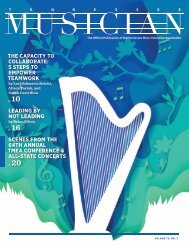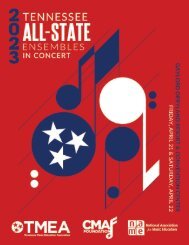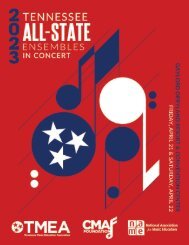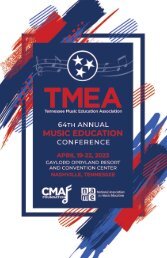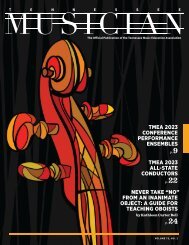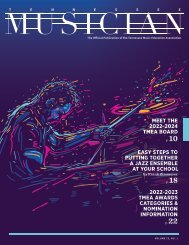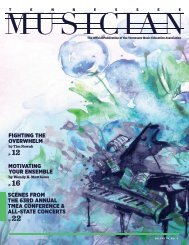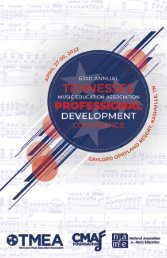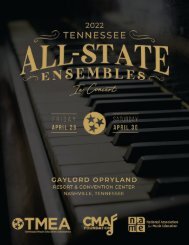TN Musician Vol. 75 No. 4
You also want an ePaper? Increase the reach of your titles
YUMPU automatically turns print PDFs into web optimized ePapers that Google loves.
The Official Publication of the Tennessee Music Education Association<br />
MUSIC ACROSS<br />
THE STATE OF<br />
TENNESSEE:<br />
HIGHLIGHTS FROM<br />
2022-2023<br />
p. 08<br />
PROGRAMMING IS<br />
EVERYTHING!<br />
by Barry Kraus<br />
p. 11<br />
VOLUME <strong>75</strong>, NO. 4
School of<br />
Music<br />
B.M. in Music Performance: Composition • Instrumental • Jazz • Musical Theatre • Piano • Vocal<br />
B.M. in Music Education: Vocal/General Music, K-12 Licensure • Instrumental/General Music, K-12 Licensure<br />
Music Minors: Music History • Music Performance • Music Technology • Music Theory & Composition<br />
tntech.edu/music<br />
(931) 372-3161<br />
music@tntech.edu<br />
1000 N. Dixie Ave.<br />
Campus Box 5045<br />
Cookeville <strong>TN</strong> 38505-0001<br />
CFA033-PRNT-23
COLLECT • SHARE • INSPIRE<br />
CONGRATULATIONS!<br />
Montgomery Central High<br />
School Band<br />
Cunningham, <strong>TN</strong><br />
“MCHS Band Chicken<br />
Fundraiser”<br />
APPLICATIONS<br />
OPEN NOW!<br />
The Advocacy in Action<br />
Awards program is designed to<br />
collect, recognize, and share<br />
effective practices and initiatives<br />
that support music education in our<br />
schools. We hope that by celebrating<br />
these programs, we can inspire others<br />
to lead by example and take action in<br />
their own programs and communities.<br />
VISIT ADVOCACY.MUSICFORALL.ORG
TABLE OF CONTENTS 2023 VOLUME <strong>75</strong>, <strong>No</strong>. 4<br />
PROGRAM NOTES<br />
04<br />
05<br />
06<br />
07<br />
TMEA Board and Council Directory<br />
2022-2023<br />
Tennessee <strong>Musician</strong> Advertiser Index<br />
Issue <strong>No</strong>. 4<br />
TMEA President’s Message<br />
Ryan Fisher<br />
TMEA Editor’s Message<br />
Anna Laura Williams<br />
08<br />
11<br />
23<br />
TEACHING IN TENNESSEE<br />
Across the State of Tennessee:<br />
Highlights from 2022-2023<br />
by TMEA Council members<br />
Programming is Everything!<br />
by Barry Kraus<br />
TMEA Back Then<br />
December 1985<br />
Tennessee <strong>Musician</strong> is mailed to members four times each year at an annual<br />
subscription rate of $5.00 (included in dues).<br />
<strong>No</strong>n-member subscription rate (includes S&H): $30.00 per school year;<br />
single copies: $10.00 per issue. Cover Image: RIE SAKAE/Shutterstock.com<br />
Postmaster - Send address changes to:<br />
Tennessee <strong>Musician</strong><br />
c/o Tennessee Music Education Association<br />
2441-Q Old Fort Pkwy, #635<br />
Murfreesboro, <strong>TN</strong> 37128-4162<br />
Published by Slate Group: 6024 45th Street, Lubbock, Texas 79407.<br />
Graphic Design: Nikki Davis. Account Executive: Ian Spector (800-794-5594).<br />
<strong>No</strong>n-Profit 501(c)(3) Organization. U.S. Postage Paid at Lubbock, Texas.<br />
ISSN Number 0400-3332; EIN number 20-3325550.<br />
Copyright © 2023 Tennessee Music Education Association. Reproduction in any form<br />
is illegal without the express permission of the editor: Anna Laura Williams, Managing<br />
Editor & Advertising Manager; anna.laura.williams@tnmea.org.<br />
Tennessee Music Education Association | www.tnmea.org | 3
TMEA BOARD AND COUNCIL<br />
tmea executive board<br />
TMEA Executive Director<br />
Michael W. Chester<br />
michael.chester@tnmea.org<br />
TMEA President<br />
Ryan Fisher, Ph.D.<br />
ryan.fisher@tnmea.org<br />
TMEA President-Elect<br />
Joel Denton<br />
leaderslead@yahoo.com<br />
TMEA Immediate Past-President<br />
Alexis Yatuzis-Derryberry<br />
derryberrya@rcschools.net<br />
TMEA Secretary<br />
Dian Eddleman<br />
deddleman@usjbruins.org<br />
tmea council<br />
WTGMEA President<br />
Jennifer Proseus<br />
wtgmeamemphis@yahoo.com<br />
WTGMEA President-Elect<br />
Allen Moody<br />
amoodyteacher@gmail.com<br />
WTVMEA President<br />
Adrian Maclin<br />
maclinal@scsk12.org<br />
WTVMEA President-Elect<br />
Reachel Hudgins<br />
reachelhudgins@dcchoctaws.net<br />
WTSBOA President<br />
Jennifer Cupples<br />
jennifer.cupples@wcsk12tn.net<br />
WTSBOA President-Elect<br />
Benjamin Martin<br />
bmartin@huntingdonschools.net<br />
tmea board of directors<br />
TMEA State General Music Chair<br />
Ben Torres<br />
benjamin.torres@cmcss.net<br />
TMEA State Choral Chair<br />
Demetrius Robinson, Ed.S.<br />
dlrbnsn2@memphis.edu<br />
TMEA State Orchestra Chair<br />
Cynthia Wright<br />
cynthia.wright@maryville-schools.org<br />
TMEA State Band Chair<br />
Ollie Liddell, Ph.D.<br />
liddello@scsk12.org<br />
TMEA State Higher Education Chair<br />
Lauren Ramey, Ph.D.<br />
lauren.e.ramey@gmail.com<br />
MTGMEA President<br />
Corynn York<br />
yorkc@rcschools.net<br />
MTGMEA President-Elect<br />
Abbi Miller<br />
abigail.miller@cityschools.net<br />
MTVA President<br />
Lorna Pyka<br />
lornapyka@yahoo.com<br />
MTVA President-Elect<br />
T.J. McLaughlin<br />
t.j.mclaughlin@sumnerschools.org<br />
MTSBOA President<br />
J.R. Baker<br />
john.baker@rcstn.net<br />
MTSBOA President-Elect<br />
Stacy Jernigan<br />
stacy.jernigan000@gmail.com<br />
TMEA NAfME Collegiate Chair<br />
Michael Chandler, Ph.D.<br />
chandlermd@apsu.edu<br />
TMEA Society for Music Teacher<br />
Education/Research Chair<br />
Loneka Wilkinson Battiste, Ph.D.<br />
lbattis2@utk.edu<br />
TMEA Advocacy and<br />
Government Relations Chair<br />
Christopher Dye, Ed.D.<br />
christopher.dye@mtsu.edu<br />
TMEA Communications Manager,<br />
Publications Editor and<br />
Advertising Manager<br />
Anna Laura Williams<br />
anna.laura.williams@tnmea.org<br />
ETGMEA President<br />
Bryant Adler<br />
etgmea@gmail.com<br />
ETGMEA President-Elect<br />
Hannah Strong<br />
hannahstrong@hvocals.com<br />
ETVA President<br />
Kristen Wiram<br />
KristenWi@gmail.com<br />
ETVA President-Elect<br />
William Brimer<br />
william.brimer@knoxschools.org<br />
ETSBOA President<br />
Jim Burton<br />
president@etsboa.org<br />
ETSBOA President-Elect<br />
Megan Christian<br />
presidentelect@etsboa.org<br />
tmea project chairs<br />
TMEA Modern Band Education Chair<br />
Michael Parsons<br />
mlparsons@briarcrest.com<br />
TMEA Jazz Education Policy Chair<br />
Frank Zimmerer, Ed.D.<br />
frank.zimmerer@mnps.org<br />
TMEA Tri-M Chair<br />
Pamela Wilensky<br />
wilenskypb@scsk12.org<br />
TMEA Music In Our Schools Month Chair<br />
Lisa Crunk<br />
crunkl@bedfordk12tn.net<br />
TMEA Music Merchants Industry Chair<br />
Scott Lane<br />
scott@lanemusic.com<br />
TMEA Retired Teachers Chair<br />
Deborah Gouge<br />
debbie.gouge@ecschools.net<br />
TMEA Webmaster<br />
John Womack<br />
john.womack@tnmea.org<br />
tmea all-state & conference management team<br />
<strong>TN</strong> All-State Choral Chair<br />
Brian Russell, DMA<br />
brian.russell@tnmea.org<br />
<strong>TN</strong> All-State Instrumental Chair<br />
Carter <strong>No</strong>blin<br />
carter.noblin@tnmea.org<br />
<strong>TN</strong> All-State Jazz Band Chair<br />
Cord Martin<br />
corderyl.martin@gmail.com<br />
<strong>TN</strong> Treble Honor Choir Chair<br />
Tiffany Barton<br />
tntreblechoir@gmail.com<br />
TMEA Conference<br />
Registration Chair<br />
Mark Garey<br />
mgarey86@comcast.net<br />
TMEA Conference Performing<br />
Ensembles Instrumental Chair<br />
John Mears<br />
mearsj@rcschools.net<br />
TMEA Conference Performing<br />
Ensembles Choral Chair<br />
Susan Kelly, DMA<br />
kellysu@rcschools.net<br />
4 | TENNESSEE MUSICIAN | 2023 | <strong>Vol</strong>ume <strong>75</strong>, <strong>No</strong>. 4
TENNESSEE MUSICIAN ADVERTISER INDEX | VOLUME <strong>75</strong>, <strong>No</strong>. 4<br />
Tennessee <strong>Musician</strong><br />
The Official Publication of the<br />
Tennessee Music Education<br />
Association<br />
Inside Front Cover<br />
Tennessee Tech. University<br />
University of Memphis Rudi E. Scheidt School of Music<br />
02 | Music for All - Advocacy<br />
in Action<br />
Center Page<br />
Bethel University Renaissance<br />
Inside Back Cover<br />
University of Tennessee at Chattanooga<br />
Back Cover<br />
Lee University<br />
19 | University of Tennessee<br />
Martin<br />
The Tennessee Music Education<br />
Association (TMEA) was officially<br />
formed in 1945 as a voluntary, nonprofit<br />
organization representing<br />
all phases of music education at all<br />
school levels. The mission of TMEA<br />
is to promote the advancement of<br />
high-quality music education for all.<br />
Active TMEA membership is open to<br />
all persons currently teaching music<br />
and others with a special interest<br />
or involvement in music education.<br />
Collegiate memberships and<br />
retired memberships are available.<br />
Additional membership information<br />
is available on the TMEA website:<br />
www.tnmea.org.<br />
The Tennessee <strong>Musician</strong> was<br />
founded in 1948 with J. Clark Rhodes<br />
appointed by the TMEA Board of<br />
Control as inaugural editor.<br />
Tennessee <strong>Musician</strong> was preceded<br />
by an earlier publication, Tennessee<br />
Music Editors’ Downbeat, which was<br />
discontinued by the TMEA Board of<br />
Control at the spring board meeting,<br />
held in Chattanooga, Tennessee, in<br />
1948.<br />
All advertising and editorial<br />
materials should be sent to<br />
Anna Laura Williams, Managing<br />
Editor and Advertising Manager;<br />
anna.laura.williams@tnmea.org;<br />
615-784-8632.<br />
Advertising information is available<br />
on the TMEA website:<br />
https://www.tnmea.org/advertising.<br />
html. Submit editorial materials by<br />
e-mail in Microsoft Word format.<br />
<strong>No</strong>n-member subscriptions and<br />
single copy orders can be placed via<br />
e-mail to the editor.<br />
10 | East Tennessee State<br />
University<br />
14 | Austin Peay State<br />
University<br />
17 | Middle Tennessee State<br />
University<br />
18 | Carson-Newman University<br />
20 | Union University<br />
21 | University of Tennessee<br />
Knoxville School of Music<br />
22 | Bob Rogers Travel<br />
24 | Slate Group<br />
Deadlines for advertisement orders<br />
and editorial materials:<br />
Issue <strong>No</strong>. 1 – Deadline: September 15<br />
(in home delivery: December/January);<br />
Issue <strong>No</strong>. 2 – Deadline: <strong>No</strong>vember 15<br />
(in home delivery: January/February);<br />
Issue <strong>No</strong>. 3 – Deadline: February 15<br />
(in home delivery: May);<br />
Issue <strong>No</strong>. 4 – Deadline: April 15<br />
(in home delivery: May/June)<br />
The views and opinions expressed in<br />
the articles included in the Tennessee<br />
<strong>Musician</strong> are those of the authors and<br />
do not necessarily reflect the official<br />
policy or position of TMEA, the<br />
members, the staff, or the advertisers.<br />
Tennessee Music Education Association | www.tnmea.org | 5
TMEA PRESIDENT’S MESSAGE<br />
Ryan Fisher, Ph.D.<br />
University of Memphis<br />
THROUGH MUSIC, WE CAN SHAPE THE<br />
HEARTS AND MINDS OF THE NEXT<br />
GENERATION OF MUSICIANS, FOSTERING<br />
A LIFELONG APPRECIATION FOR THE<br />
BEAUTY AND POWER OF THE ARTS.<br />
In our final issue of this year’s Tennessee <strong>Musician</strong> volume, we<br />
feature articles that focus on celebrating successes from the<br />
2022-2023 academic year and considering possibilities for the<br />
upcoming school year. Throughout my teaching career, I have<br />
cherished my summer “breaks” which allowed me to reflect<br />
on the accomplishments of the previous years, make plans and<br />
prepare for the next academic year, participate in professional<br />
development opportunities, and rest. It is important to take time<br />
during the summer for self-care and regeneration.<br />
As we prepare to embark on another academic year filled with<br />
opportunities to nurture the musical talents of our students,<br />
it is crucial to remember the profound impact of aesthetic<br />
experiences when listening to and performing music. These<br />
experiences have the potential to touch our souls, transcending<br />
the ordinary and allowing us to glimpse the extraordinary. Just<br />
recently, I had the privilege of leading a group of 35 students from<br />
my university on a transformative tour of Greece. Amidst the rich<br />
historical backdrop, it was the music that truly stirred our hearts.<br />
One particular performance in Corfu left an indelible mark on<br />
our souls. The captivating melodies and harmonies produced by<br />
our students moved us to tears, evoking an overwhelming sense<br />
of awe and joy. It was an experience that cannot be replicated or<br />
manufactured; it was a perfect convergence of talent, passion, and<br />
dedication.<br />
Renowned music educator Bennett Reimer wrote, “Music<br />
immerses us in the raw reality of feeling—its naked, subtle,<br />
exquisite truth, the truth of conscious being. This accounts<br />
for its charm and joyousness, and also its profundities and<br />
awesomeness—the entire spectrum of aware undergoing”<br />
(Reimer, 2003, p. 94). Indeed, our experience in Corfu exemplified<br />
this idea. The music we created together transcended the mere<br />
combination of notes and rhythms; it became a conduit for the<br />
expression of our deepest emotions and a means to connect with<br />
one another and the world around us.<br />
In their book “Your Brain on Art: How the Arts Transform Us,”<br />
Magsamen and Ross delve into the neurological process behind<br />
aesthetic experiences. They explain how the brain’s response to<br />
art and music can lead to heightened emotions, introspection, and<br />
a sense of wonder. When we engage in music, our neural pathways<br />
light up, allowing us to perceive beauty, experience emotional<br />
resonance, and find meaning in the art form. These neurological<br />
processes are at the core of the transformative power of music,<br />
enabling us to forge profound connections with ourselves, our<br />
students, and our audiences.<br />
As we prepare for another academic year, let us recall the aesthetic<br />
experiences we have had as music teachers and musicians.<br />
Remember the moments when you were moved to tears by the<br />
sheer beauty of a performance, when the music resonated so<br />
deeply within you that it felt like a spiritual awakening. These<br />
experiences are the foundation of our intrinsic motivation to<br />
inspire our students and ignite their passion for music.<br />
Let us carry the stories of our students’ achievements, the<br />
inspiration we have received from their performances, and the<br />
knowledge of the transformative power of music within us. May<br />
these experiences serve as a driving force, empowering us to<br />
inspire our students and nurture their own aesthetic journeys.<br />
Through music, we can shape the hearts and minds of the next<br />
generation of musicians, fostering a lifelong appreciation for the<br />
beauty and power of the arts.<br />
Ryan Fisher, Ph.D.<br />
39th TMEA President<br />
Magsamen, Susan, and Ivy Ross. Your Brain on Art: How the Arts<br />
Transform Us. Random House, 2023.<br />
Reimer, Bennett. A Philosophy of Music Education: Advancing the<br />
Vision. 3rd ed. Upper Saddle River: Prentice Hall, 2003.<br />
6 | TENNESSEE MUSICIAN | 2023 | <strong>Vol</strong>ume <strong>75</strong>, <strong>No</strong>. 4
TMEA EDITOR'S MESSAGE<br />
Anna Laura Williams<br />
Siegel Middle School<br />
AS I HAVE BEEN RESEARCHING THE HISTORY<br />
OF THE TENNESSEE MUSICIAN AND PREPARING<br />
TO COMMEMORATE THE <strong>75</strong>TH ANNIVERSARY<br />
OF OUR PUBLICATION, I HAVE BEEN MOVED BY<br />
THE DETERMINATION AND SELFLESSNESS OF<br />
OUR TMEA PREDECESSORS.<br />
The extraordinary work of music educators across our state<br />
is a continual source of inspiration. Throughout time,<br />
Tennessee music teachers have made a remarkable difference<br />
in the lives of countless students.<br />
In the Present<br />
In this issue of the Tennessee <strong>Musician</strong>, we spotlight the<br />
outstanding music education occurring in East, Middle, and West<br />
Tennessee. I want to recognize the Presidents and President-<br />
Elects of the regional music education organizations for their<br />
superb leadership and for sharing highlights from the 2022-2023<br />
academic year. Thank you for the excellent music experiences you<br />
provide to students every day in our state.<br />
In the Past<br />
The upcoming 2023-2024 publication cycle marks the <strong>75</strong>th<br />
Anniversary of the Tennessee <strong>Musician</strong>. Since the inaugural<br />
issue in 1948, the Tennessee <strong>Musician</strong> has been integral for<br />
the Tennessee Music Education Association to communicate<br />
countless triumphs of music education statewide. As I have been<br />
researching the history of the Tennessee <strong>Musician</strong> and preparing<br />
to commemorate the <strong>75</strong>th Anniversary of our publication, I have<br />
been moved by the determination and selflessness of our TMEA<br />
predecessors. In <strong>Vol</strong>ume 76 of the Tennessee <strong>Musician</strong>, it is my<br />
intention to help honor the past as we look toward the future.<br />
In the Future<br />
Every Tennessee music educator has an important part in<br />
continuing the outreach of music education in our state. We have<br />
an exclusive opportunity to make a positive difference for others.<br />
The upcoming school year marks a new chapter in Tennessee<br />
music education history, and I look forward to what we can<br />
collectively accomplish through music education together in the<br />
future.<br />
Anna Laura Williams<br />
17th Editor, Tennessee <strong>Musician</strong><br />
Tennessee Music Education Association | www.tnmea.org | 7
TMEA TEACHING IN TENNESSEE<br />
MUSIC ACROSS THE STATE<br />
OF TENNESSEE:<br />
HIGHLIGHTS FROM THE<br />
2022-2023 SCHOOL YEAR<br />
by members of the TMEA Council:<br />
regional music associations -<br />
President and President-Elect<br />
EAST TENNESSEE<br />
ETGMEA<br />
Bryant Adler, President<br />
Hannah Strong, President-Elect<br />
The East Tennessee General Music Education Association<br />
(ETGMEA) had an excellent 2022-2023 school year. We hosted<br />
two workshops that brought top local and national presentations<br />
to our members.<br />
Our summer workshop in July featured three local presenters:<br />
Christine Bock (Knox County), Carly Egan (Alcoa City), and<br />
Marcus Smith (Knox County). Our winter workshop in January<br />
featured Dr. Marla Butke presenting on Dalcroze Eurhythmics.<br />
An additional highlight for our association is that member Jason<br />
Glashauser (South Clinton Elementary) was selected as 2023<br />
CMA Foundation’s Music Teacher of Excellence. This is Jason’s<br />
second year in a row of being selected for this honor!<br />
ETSBOA<br />
Jim Burton, President<br />
Megan Christian, President-Elect<br />
The East Tennessee Band and Orchestra<br />
Association (ETSBOA) is proud to have offered the<br />
following over the past school year:<br />
• Three regional Junior Band Clinics serving 766 students<br />
in 7th, 8th, and 9th grade.<br />
• Three regional Junior Orchestra Clinics serving 241<br />
students in 7th, 8th, and 9th grade.<br />
• All-State East comprised of four Bands (two 9th-10th grade<br />
bands and two 11th-12th grade bands) and two Orchestras<br />
(String/Symphony) with 639 participants in 9th-12th grade.<br />
• All-State East Jazz Clinic featuring 60 students in 9th-12th<br />
grade.<br />
• Three regional Concert Performance Assessment events<br />
with 70 Bands and 11 Orchestras.<br />
• Three regional Solo & Ensemble Festivals serving 994<br />
students in 6th-12th grade.<br />
• All-State East Director’s Professional Development Sessions<br />
featuring Randall Coleman (UTC), Dr. John Zastoupil<br />
(UTK), Alex White (John Sevier Middle School), Ron Rogers<br />
(Retired), and the Mind the Gap panel.<br />
ETVA<br />
Kristen Wiram, President<br />
William Brimer, President-Elect<br />
The East Tennessee Vocal Association (ETVA) enjoyed a<br />
productive and successful 2022-2023 year thanks to its dedicated<br />
members. The organization implemented an audition system<br />
for the Middle School All-East Choirs and hosted the event at<br />
First Baptist Church of Maryville; the Treble Choir was directed<br />
by Dr. Lauren Ramey and the Mixed Choir was directed by Dr.<br />
Chantae Pittman.<br />
ETVA adopted an online judging platform to streamline the<br />
high school All-East Choir auditions. The High School All-<br />
East choirs were hosted at Clayton Center for the Arts at<br />
Maryville College of which the Ninth Grade Choir was directed<br />
by Emily Floyd, the SATB Choir was directed by Dr. Cameron<br />
Weatherford, the SSAA Choir was directed by Dr. Morgan<br />
Luttig, and the TTBB Choir was directed by Dr. Alan Stevens.<br />
ETVA hosted Concert Performance Assessments for middle<br />
school choirs and regional Concert Performance Assessments<br />
(J.B. Lyle Choral Festival) for high school choirs. Lastly,<br />
ETVA continued its mission to promote excellence in vocal<br />
music education by offering the Louise Stephens Vocal Music<br />
Scholarship worth $2,000 to an East Tennessee graduating high<br />
school senior majoring in vocal music education. This year's<br />
recipient was Nina Fabiano from McMinn County High School.<br />
WEST TENNESSEE<br />
WTGMEA<br />
Jennifer Proseus, President<br />
Allen Moody, President-Elect<br />
In Fall 2022, West Tennessee General Music Education<br />
Association (WTGMEA) hosted a chapter share workshop at<br />
the University of Memphis. Presenters included Candice<br />
Ammons, Thomas Cesario, Marie Millikin, and Mary Elizabeth<br />
Washburn. They shared some terrific tips and repertoire with<br />
our members, and we enjoyed coffee and donuts.<br />
In February 2023, we hosted our regional Treble Choir Festival<br />
at Millington First Baptist Church. Dr. Patrick Scott was an<br />
incredible clinician for this day-long music-making event. He<br />
directed treble students from 20 different schools in a beautiful,<br />
uplifting choral concert.<br />
WTSBOA<br />
Jennifer Cupples, President<br />
Benjamin Martin, President-Elect<br />
MUSIC<br />
ACROSS THE STATE OF<br />
TENNESSEE<br />
West Tennessee School Band and Orchestra Association<br />
(WTSBOA) had over 100 groups participate in Concert Festival<br />
this year and had the Memphis area festival in the new fine arts<br />
building at the University of Memphis.<br />
Approximately 3,000 students auditioned for the All-West Band,<br />
Orchestra, and Jazz ensembles this year which is an increase<br />
8 | TENNESSEE MUSICIAN | 2023 | <strong>Vol</strong>ume <strong>75</strong>, <strong>No</strong>. 4
from last year after the COVID-19 pandemic. This was the second<br />
year that our All-West Clinic Weekend was hosted in the newly<br />
renovated Renasant Convention Center in Memphis with all<br />
performances in the Cannon Center for the Performing Arts.<br />
West Tennessee groups that performed at the TMEA Conference<br />
included Sound Fuzion from the University of Memphis and the<br />
Collierville High School Wind Ensemble. Briarcrest Christian<br />
School served as the site host for the inaugural TMEA All-<br />
State Modern Band. Eight ensembles and seventeen solos<br />
from WTSBOA auditioned for the opportunity to perform in<br />
the Tennessee Bandmasters Association Solo & Ensemble<br />
performance this year at the TMEA Conference.<br />
WTVMEA<br />
Adrian Maclin, President<br />
Reachel Hudgins, President-Elect<br />
We had a very successful school year in the West Tennessee Vocal<br />
Music Educators Association (WTVMEA). Our regional honor<br />
choirs were a huge success. Our senior high ensembles were<br />
conducted by Dr. Dante Webb and Dr. Gaylon Robinson, both of<br />
whom taught choral music in Shelby County until they moved on<br />
to pursue advanced degrees. Joseph Powell (White Station High<br />
School) was awarded Music Teacher of Excellence by the CMA<br />
Foundation, and J.D. Frizzell and Frances Cathlina are semifinalists<br />
for the 2024 Grammy Music Educator Award.<br />
There were multiple West Tennessee schools who took choirs to<br />
national and international festivals and returned with Superior<br />
plaques and trophies. Briarcrest Christian School and Collierville<br />
High School performed tours of Spain and England, respectively.<br />
A special thanks to Dru Davidson, who has served as the Fine Arts<br />
Coordinator for Shelby County Schools for the past seventeen<br />
years, and to Mrs. Carol Culbreath, who spent her 40-year long<br />
career at Whitehaven High School. The choral community in<br />
West Tennessee wishes you both, along with the many retiring<br />
music educators in this region, the very best. Thank you all for<br />
the decades you have spent investing in the lives of children<br />
and their families in West Tennessee.<br />
MIDDLE TENNESSEE<br />
MTGMEA<br />
Corynn York, President<br />
Abbi Miller, President-Elect<br />
Middle Tennessee General Music Education Association<br />
(MTGMEA) offered membership through their organization this<br />
past school year for the first time in recent history. MTGMEA<br />
offered a professional development workshop for music teachers<br />
in Fall 2022. This event had a great turnout and helped increase<br />
interest in our organization and build community among general<br />
music teachers in the area.<br />
This year, we launched our newsletter, which features updates<br />
on all general music events in the Middle Tennessee area and<br />
spotlights a different general music teacher in the Middle<br />
Tennessee area. We proudly welcome Christina Stuible as our<br />
President-Elect for 2023-2025. She is in her second year teaching<br />
general music and choir at McFadden School of Excellence. We<br />
are excited about her new ideas and fresh perspective.<br />
MTSBOA<br />
J.R. Baker, President<br />
Stacy Jernigan, President-Elect<br />
The 2022-2023 school year was a successful<br />
year for the Middle Tennessee Band & Orchestra Association<br />
(MTSBOA) with our band and orchestra programs thriving in<br />
a full year of post-pandemic normalcy. Our membership hit<br />
record numbers as we have over 400 members for the first time<br />
in history. Participation was up at all of our major events this<br />
year, and we saw our Mid-State auditions and CPA numbers back<br />
up to pre-COVID levels. MTSBOA continued to refine our Mid-<br />
State audition process, and this year was our first time using<br />
composed etudes.<br />
Our members were honored with several accolades, including<br />
several being recognized as CMA Music Teachers of Excellence,<br />
TMEA award winners, and a plethora of other honors.<br />
Ravenwood High School won the MTSU Contest of Champions<br />
for the first time. Metro Nashville Public Schools organized and<br />
hosted the MNPS Marching Classic, spotlighting its marching<br />
bands performing a variety of marching styles. <strong>No</strong>lensville<br />
High School gave a stellar performance at the TBA Hall of Fame<br />
concert at TMEA. Eight of our band programs were awarded<br />
the ASBDA Award of Distinction, and two of our orchestra<br />
programs were awarded the ASTA Award of Distinction in<br />
concert performance. MTSBOA also awarded two very talented<br />
students with scholarships to help with their college expenses.<br />
We are proud of all the accomplishments of this year and<br />
look forward to a great year next year!<br />
MTVA<br />
Lorna Pyka, President<br />
T.J. McLaughlin, President-Elect<br />
Middle Tennessee Vocal Association (MTVA) successfully put<br />
on the following events this year: Middle School Mass Choral<br />
Festival, Freshman-Midstate Honor Choir, Elementary Mass<br />
Choral Festival, Elementary/Middle School Honor Choirs, Choral<br />
Performance Festival, and Solo & Ensemble. We were especially<br />
excited to be able to bring back our Elementary Mass Choral<br />
Festival this year, as we had not been able to have that event since<br />
before the COVID-19 pandemic.<br />
We had a significant rise in the number of schools/students who<br />
auditioned for and participated in events this year. We were<br />
also proud to not only have several of our local directors serve<br />
as clinicians this year, but also host clinicians from Trevecca,<br />
Georgia State, UTC and TTU. We made some changes to our<br />
Choral Performance Assessment that allowed this event to be<br />
better accessible to more schools, and we continue to add more<br />
members to our organization. We are looking forward to an even<br />
more successful year next year!<br />
Tennessee Music Education Association | www.tnmea.org | 9
DEPARTMENT OF MUSIC<br />
• Degrees in Performance, Music<br />
Education, Contemporary Music<br />
Performance, Composition, and<br />
Music History<br />
• Nationally-recognized classical<br />
and contemporary ensembles<br />
• Award-winning faculty who care<br />
about student success<br />
Make Your<br />
Dreams a reality<br />
• Competitive scholarships up<br />
to full tuition available for<br />
music majors<br />
• Scholarships available to<br />
all non-music majors who<br />
participate in ensembles<br />
Want us to<br />
contact you?<br />
Scan now!<br />
etsu.edu/music<br />
Facebook.com/ETSUMusic<br />
GoETSUMusic<br />
The ETSU Department of Music is fully accredited by the National Association of Schools of Music.<br />
ETSU is an Equal Opportunity/Affirmative Action University: etsu.edu/universitycounsel/compliance. ETSU-230761-A-23 Designed and produced by BMC Creative.
TMEA TEACHING IN TENNESSEE<br />
Programming is<br />
Everything!<br />
by Barry Kraus<br />
In a recent conversation about the process of selecting music,<br />
one of my colleagues enthusiastically stated, “Programming is<br />
EVERYTHING!” While our conversation was focused upon the<br />
reasons why we choose literature for various events—one being<br />
assessment—the statement is true. Selecting music in the right<br />
combinations with attention to our context can determine our<br />
level of success as directors. Discussions surrounding repertoire<br />
selection typically involve suitability, grade level, technical<br />
elements, and instrumentation. However, programming is how<br />
we not only meet our immediate goals of curricular necessity<br />
but also how we balance the ingredients. As I begin a new season<br />
of programming for my own ensembles, I am immersed in the<br />
process of designing experiences for student growth as well as<br />
audience engagement. The following thoughts are found in my<br />
own process of making programming choices.<br />
For the past 50 years, prevailing music education philosophy<br />
has urged us to educate the aesthetic senses through exposure<br />
to meaningful works of art (Reimer, 2003). The artistic use of<br />
color, shape, sound, and form are of prime importance in creating<br />
opportunities for students to hone aesthetic perception and<br />
react—favorably or not—to new musical experiences. The contour<br />
of a single concert performance, as well as a full concert season,<br />
should be planned in a way to introduce a myriad of concepts,<br />
sounds, and structures that cater to the aesthetic senses. To this<br />
end, a balanced musical programming strategy, both short and<br />
long term, is vital to achieving our mission as music educators<br />
and critical to garnering support for our programs.<br />
BUT, MY ENSEMBLE WILL NEVER PLAY THAT!<br />
Undergraduate training is typically immersed in the core<br />
repertoire of the band profession through ensemble experiences<br />
and method course curriculum and may be at odds with the<br />
reality of a first job (Mertz, 2018). Knowledge of Grainger,<br />
Hindemith, Holst, and Husa may seem less of a priority in a first<br />
teaching position standing in front of a developing middle school<br />
band or a rural high school wind ensemble with incomplete<br />
instrumentation. In teaching developing students, we are<br />
Tennessee Music Education Association | www.tnmea.org | 11
TMEA TEACHING IN TENNESSEE<br />
grounded in the repertoire that is appropriate for our students’<br />
abilities and may lose sight of pieces we may never approach with<br />
our own group.<br />
Knowing the works of significant composers guides our<br />
programming practices. If we are aware of beauty in design of<br />
what we know to be the core works in our field, as well as staying<br />
abreast of new compositions, we are more apt to seek those<br />
traits in selections that meet the ability level of our students. As<br />
educational theory suggests, our curriculum should advance in<br />
a way that students revisit concepts over time (Bruner, 1960),<br />
connect to previous experiences, and participate in unfamiliar<br />
learning through careful scaffolding in their developmental zone<br />
(Hopkins, 2013). The musical signatures of significant composers<br />
will be present, in some way, in quality works at lower grade levels,<br />
and we can revisit concepts through increasing complexity over<br />
the course of a student’s time with us.<br />
PROGRAM FOR THE AUDIENCE, TOO.<br />
While an audience full of parents will politely and<br />
enthusiastically applaud every piece on the program, parents<br />
are also discriminating listeners capable of making critical<br />
assessments of what is being played on stage. Appealing to<br />
the intellects and aesthetic sensitivity of our audiences is<br />
always encouraged and will reap benefits that support our<br />
mission. Variety is critical. On a single performance, consider a<br />
combination of works that provides diversity in key structure,<br />
rhythm, orchestration, form, and development. A concert<br />
program that represents musical depth and is sufficiently<br />
unpredictable creates a landscape for thought with listeners.<br />
This kind of planning shows our commitment to programming<br />
through analytical thinking over visceral reaction.<br />
APPEALING TO THE INTELLECTS<br />
AND AESTHETIC SENSITIVITY<br />
OF OUR AUDIENCES IS ALWAYS<br />
ENCOURAGED AND WILL<br />
REAP BENEFITS THAT SUPPORT<br />
OUR MISSION.<br />
Be prepared to talk to the audience about the music. While the<br />
music was selected with students in mind, the challenge is to<br />
engage the audience in the process (Reynolds, 2000). There is<br />
no shortage of works with an onomatopoeia title and composerwritten<br />
program notes filled with adjectives (fiery, soaring,<br />
majestic, etc.). Consider how these descriptions sound to an<br />
audience of working professionals and apply sparingly. It is<br />
always advisable to write your own notes from your analysis of<br />
the music. One of the most important advocacy moments can<br />
be found in an intelligent verbal program note telling listeners<br />
about the significance of the work that you have chosen—guiding<br />
their listening in challenging ways. If there is little to say about<br />
the music, perhaps it was not the correct choice. Intentional<br />
programming with audience in mind will make this an easy task.<br />
CONSIDER VALUE AND PITFALLS<br />
IN EDUCATIONAL MUSIC<br />
The body of repertoire for school bands has grown substantially.<br />
Between 2007 and 2012, 5,903 new titles were introduced, and<br />
4,<strong>75</strong>8 were new original works for concert band (Weller, 2014).<br />
This is an important resource as it is widely available, designed<br />
to match curriculum, and suitable to a broad range of ensemble<br />
shapes, sizes, and abilities. However, disagreements have arisen<br />
regarding the format of educational compositions dubbed as<br />
made-for-school music (Budiansky & Foley, 2005)—most often<br />
written in a commercially successful template that, if used<br />
exclusively, can limit the musical content to which our students<br />
are exposed. Programming without careful consideration may<br />
result in a concert that contains several works exhibiting similar<br />
form and content.<br />
Educational compositions continue to be a significant source for<br />
assessment in the profession. A 2022 survey of Concert Festival<br />
Assessment programs in Tennessee found that the ten most<br />
cited composers were current popular names in the educational<br />
publishing industry and were cited 92 times (38%) in the 239<br />
works performed. Of the ten, several were credited for the same<br />
piece more than two times, and the most cited composer had<br />
23 performances (Kraus, 2023). This is not an aspersion on<br />
composers or their music—only an observation of the ubiquity<br />
of the medium. Certainly, selecting music for festival assessment<br />
involves scrutiny as success is attached to perceived teaching<br />
effectiveness (Hash, 2013), and the educational publishing<br />
template provides a trustworthy route. <strong>No</strong>netheless, we should<br />
be aware of patterns in our choices and the rationales that<br />
influence our decisions. While the impact of educational<br />
publishing on our repertoire is valuable, seeking diversity in<br />
content is our challenge.<br />
PRACTICE SENSITIVITY AND SENSIBILITY<br />
Current trends in cultural responsiveness challenge us to seek<br />
musical styles outside of the Western canon, and modern music<br />
education philosophy promotes a broad approach to music<br />
making as well as fluency in global music styles (Elliot, 1995).<br />
Following this trend, the band repertoire has been infused with<br />
many authentic works written by diverse composers. There are<br />
also works that, while well-intentioned, may cross into cultural<br />
appropriation—inaccurately borrowing cultural customs,<br />
practices, or ideas and written by a composer not of the culture.<br />
Similarly, repertoire influenced by political ideology, sensitive<br />
issues, and social critique requires a framework for discussion to<br />
be interpreted successfully. It behooves us to research our choices<br />
when considering music that may stretch cultural, social, and<br />
political boundaries. Programming from diverse and authentic<br />
perspectives can be a new horizon if approached intentionally,<br />
and these options exist.<br />
12 | TENNESSEE MUSICIAN | 2023 | <strong>Vol</strong>ume <strong>75</strong>, <strong>No</strong>. 4
PREPARE. PERFORM. PRODUCE.<br />
JOIN THE<br />
EXPERIENCE<br />
VOCAL<br />
INSTRUMENTAL<br />
THEATRE<br />
PRODUCTION<br />
Experience, students can expand their vocal,<br />
instrumental, theatrical, and production talents, while<br />
working toward a degree in their choice of the<br />
receiving hands-on learning experience that can be<br />
applied to their future professional careers. Participate<br />
in one of our upcoming audition days and see what<br />
opportunities are waiting for you with Bethel University’s<br />
Renaissance Program.<br />
SCHEDULE<br />
YOUR<br />
AUDITION<br />
TODAY!<br />
36 DEGREES OFFERED<br />
INCLUDING:<br />
- BIOLOGY<br />
- BUSINESS ADMINISTRATION<br />
- CRIMINAL JUSTICE<br />
- EDUCATION<br />
- MUSIC<br />
- PSYCHOLOGY<br />
731.352.6980<br />
BethelRenaissance.com<br />
@BURenaissance
DEPARTMENT OF<br />
MUSIC<br />
CONCENTRATIONS IN:<br />
Music Performance • Music Education • Music Therapy<br />
Composition • Liberal Studies<br />
Visit us online for audition dates and<br />
scholarship information.<br />
apsu.edu/music<br />
931-221-7818 • music@apsu.edu<br />
Austin Peay State University does not discriminate on the basis of race, color, religion, creed, national origin, sex, sexual orientation, gender identity/expression, disability, age,<br />
status as a protected veteran, genetic information, or any other legally protected class with respect to all employment, programs and activities sponsored by APSU. Policy 6:001<br />
AP119/10-21/1
FINAL THOUGHTS<br />
The music that we select is a direct reflection of our own aesthetic<br />
perception and reveals the experiences that we want for our<br />
students and audiences. Along the way, someone provided us<br />
with the opportunity to understand and appreciate something<br />
complex, form an opinion, and perceive a deeper meaning. It is our<br />
responsibility to do the same for our students and the audiences<br />
who come to hear the music. Where do we begin? Here are eight<br />
suggestions for the next year.<br />
1. Begin by making a list of potential works now for the next<br />
season—longer than you will need. Keep this in a place where<br />
you can access it easily. Add to it when you discover a new<br />
piece. Often, you will find that a work may not fit the ability<br />
of the group but may be appropriate later as the students<br />
develop.<br />
2. Listen to everything—even works beyond current student<br />
ability. Allow the endorphins to pass and then study the<br />
score if possible. Allow a composition some time to make<br />
an impression on you beyond the visceral response. A work<br />
with an instant auditory appeal may display less depth after<br />
seeing the score. Conversely, a substantial and well-crafted<br />
work may not have an initial appeal and require longer study<br />
to comprehend.<br />
3. Include works that you don’t know. A wonderful resource<br />
for new music is the College Band Directors National<br />
Association Report, an online published listing of collegiate<br />
band concert programs from around the country. As well,<br />
the Institute for Composer Diversity maintains a criteriasearchable<br />
database containing titles for composers in<br />
underrepresented groups. New and unknown composers<br />
frequently appear in these listings, and both are found with a<br />
simple web search.<br />
4. Make notes in your list about tonal structure, texture,<br />
instrumentation, rhythmic content, form, and compositional<br />
devices. Seek works that both exhibit and move beyond<br />
the standard ternary (ABA) form and associated tonal<br />
relationships. Audiences want to connect with recognizable<br />
form and structure, but a work that utilizes unfamiliar<br />
language can create interest. Consider pairings and contrast<br />
and begin moving works together in potential combinations<br />
that become individual concert programs.<br />
5. Commission a new work with others in your circle. The<br />
creative process of seeing a composition to completion,<br />
particularly when the composer has a unique perspective,<br />
and giving a premiere performance is an educational<br />
experience for all.<br />
6. Consider current social and cultural trends as well as world<br />
events. What selections might be relevant in an abstract way?<br />
Build a framework for conversation and seek authenticity.<br />
7. Research your selections. Write detailed program notes that<br />
go far beyond the often-simple note provided. Assemble<br />
significant information that helps musicians and audience<br />
understand the music.<br />
8. Consider the attention span of the audience and what it<br />
might be like to listen through the sonic landscape of your<br />
crafted programs. Would you remain interested? Do works<br />
sound too similar? Move some items around on your list and<br />
try a new combination.<br />
In taking time to seek excellent literature and program<br />
thoughtfully, we provide opportunities to broaden perception<br />
and sensory knowing, encouraging the ability to discriminate<br />
between musical contexts (Reimer, 2003). The observations<br />
and admonitions in this article are found in my own experience<br />
as a conductor making programming decisions for students as<br />
well as professionals. The tenet of teaching with quality music<br />
in the right combinations is valid at any level, and successful<br />
concert planning requires time, bravery, and creative thought.<br />
Our passions are rekindled through the pursuit of music that<br />
reinvigorates our inner artist and compels us to share the<br />
experience with both musicians and audience. Programming is<br />
EVERYTHING! Choose wisely!<br />
Tennessee Music Education Association | www.tnmea.org | 15
TMEA TEACHING IN TENNESSEE<br />
References<br />
Bruner, J. (1960). The process of education. New York, N.Y.,<br />
Vintage Books.<br />
Budiansky, S., & Foley, T. (2005) The quality of repertoire<br />
in school music programs: literature review, analysis,<br />
and discussion. Journal of the World Association for<br />
Symphonic Bands and Ensembles, 12, 17–39.<br />
Elliott, D. (1995). Music matters: a new philosophy of music<br />
education. New York, N.Y., Oxford University Press.<br />
Hash, P. (2013). Large-group contest ratings and music teacher<br />
evaluation: issues and recommendations. Arts<br />
Education Policy Review, 114, 163-169.<br />
Hopkins, M. (2013). Programming in the zone: repertoire<br />
selection for the large ensemble. Music Educators<br />
Journal, 99(4), 69–74.<br />
Kraus, B. (2023). A survey of concert performance assessment<br />
programming in Tennessee. [Unpublished manuscript].<br />
Mertz, J. (2018). Tension in the band repertoire selection<br />
process: issues of compatibility between training, belief,<br />
and practice [Doctoral dissertation, Boston University].<br />
ProQuest Dissertations & Theses Global.<br />
Reimer, B. (2003). A philosophy of music education: advancing<br />
the vision. Upper Saddle River, N.J., Prentice Hall.<br />
Reynolds, H.R. (2000). Repertoire is the curriculum. Music<br />
Educators Journal, 87 (1), 31-33.<br />
DR. BARRY KRAUS is Director of Bands,<br />
Instrumental Area Coordinator, and<br />
Associate Professor of Music at Belmont<br />
University where he conducts the<br />
Concert Band and Wind Ensemble and<br />
teaches graduate and undergraduate<br />
courses in conducting and music<br />
education. Prior to Belmont, he held<br />
positions at Baylor University, The<br />
University of Texas at Austin, and public and private schools in<br />
Arizona, Oklahoma, and Texas.<br />
He holds the Doctor of Musical Arts Degree from Arizona State<br />
University, Master of Music Degree from Baylor University, and<br />
the Bachelor of Music Degree from Oklahoma State University.<br />
His primary conducting teachers were Gary Hill, Michael<br />
Haithcock, Joseph Missal, and Steven Heyde.<br />
Kraus has presented research and clinic sessions at conventions<br />
of the Tennessee Music Education Association, Texas Music<br />
Educators Association, National Association for Music<br />
Education, CBDNA National Conference, and the International<br />
Conference for Arts and Humanities.<br />
He has served as Higher Education Chair for the Tennessee<br />
Music Education Association and as Collegiate Representative<br />
for the Middle Tennessee School Band and Orchestra<br />
Association. He is a member of the College Band Directors<br />
National Association, National Association for Music Education,<br />
Pi Kappa Lamba, and Phi Betu Mu. He is also a member of Phi<br />
Mu Alpha Sinfonia and holds honorary memberships in<br />
Kappa Kappi Psi and Tau Beta Sigma.<br />
Music Education and<br />
Social Emotional Learning<br />
This brochure includes key talking points for music education<br />
advocates to use as they communicate with decision-makers<br />
about the place of music education in any school setting.<br />
Download your brochure at bit.ly/MusicEduSEL<br />
Questions? Email advocacy@nafme.org<br />
16 | TENNESSEE MUSICIAN | 2023 | <strong>Vol</strong>ume <strong>75</strong>, <strong>No</strong>. 4
Advance Your<br />
Career in<br />
Education<br />
Apply now for<br />
the Master of Music<br />
in Music Education.<br />
Two-year cohort,<br />
fully online.<br />
Taught by<br />
leading music<br />
education faculty<br />
Dr. Christopher Dye Dr. Jamila McWhirter Dr. Jennifer Vannatta-Hall<br />
SCHOOL OF MUSIC<br />
615-898-2469 • Joseph.Morgan@mtsu.edu<br />
0222-0414 / Middle Tennessee State University does not discriminate on the basis of race, color, national origin, sex, or disability. See our full policy at mtsu.edu/iec.
MUSIC DEPARTMENT<br />
MAJORS: Music Education,<br />
Performance, Church Music, Music with<br />
an Outside Field, Worship Leadership,<br />
Bachelor of Arts<br />
Generous scholarships for music<br />
majors including full-tuition awards<br />
Ensembles Scholarships available for<br />
non-music majors<br />
Combine Bachelor of Arts with a<br />
second major<br />
Scan here if you’d like<br />
to be contacted by<br />
a member of the<br />
Music Faculty.<br />
February 25, 2023, Music Scholarship Audition Day and Tarr<br />
Full-Tuition Competition. Contact us if you need an alternative<br />
audition day.<br />
FOUND:<br />
YOUR PLACE. YOUR PATH. YOUR PURPOSE.<br />
18 | TENNESSEE MUSICIAN | 2023 | <strong>Vol</strong>ume <strong>75</strong>, <strong>No</strong>. 4<br />
Apply to C-N!<br />
www.cn.edu/apply
APPLY & AUDITION<br />
GRASSROOTS<br />
ACTION CENTER<br />
Add Your Voice to the Legislative Process<br />
On the NAfME Grassroots Action<br />
Center page, you can:<br />
• Support music education in<br />
federal education policy<br />
• Get involved with the<br />
legislative process<br />
• Engage your members<br />
of Congress<br />
Go to bit.ly/NAfMEgrassroots<br />
(case-sensitive) and take<br />
action today.<br />
NAfME<br />
SCHOLARSHIPS<br />
Available for music majors, music minors,<br />
and campus musicians.<br />
DEGREES<br />
Bachelor of Music<br />
Performance, Music Education, Pedagogy<br />
Bachelor of Arts in Music<br />
Music Minor<br />
NEW CERTIFICATES<br />
New to UTM Music: Add to your degree:<br />
Certificate in Secondary Music Education Studies<br />
Certificate in Secondary Music Studies<br />
Certificate in Music Performance<br />
REQUEST INFORMATION<br />
For more information:<br />
(731) 881-7402<br />
music@utm.edu
BE EXCELLENT. BE CHRIST-CENTERED.<br />
BE TRANSFORMED.<br />
At Union University, you will develop your musical craft under the training of highly qualified<br />
professional musicians who personally care for their students, passionately engage the<br />
artform, and are thoroughly committed to the Lord. You will experience an excellence-driven,<br />
Christ-centered music education designed to help you discover God’s unique calling and<br />
equip you for success in your life and career.<br />
Programs include:<br />
Bachelor of Music in Music Education<br />
Bachelor of Music in Performance<br />
Bachelor of Music in Commercial Music<br />
Bachelor of Arts/Science in Music<br />
Bachelor of Music in Composition<br />
Bachelor of Music in Music Theory<br />
Bachelor of Music in Worship Leadership<br />
2023 Audition Date: March 31<br />
NASM accredited since 1966<br />
LEARN MORE AT uu.edu/music<br />
BE TRANSFORMED
YOUR STAGE<br />
IS WAITING<br />
Join a close-knit network of passionate students and<br />
world-class faculty in a community of artists and<br />
scholars that will empower you to achieve your dreams.<br />
APPLY<br />
music.utk.edu<br />
music@utk.edu<br />
865-974-3241 @UTKSOM<br />
Tennessee Music Education Association | www.tnmea.org | 21
TO US,<br />
EVERY<br />
MOMENT<br />
MATTERS.<br />
You create the music, we’ll do the rest.<br />
since<br />
1981<br />
we’ve been working<br />
with directors to create<br />
incredible student<br />
travel experiences.<br />
over<br />
6,500<br />
custom trips planned<br />
to destinations in the<br />
U.S. and abroad,<br />
no two alike.<br />
bobrogerstravel.com<br />
Making Moments<br />
That Matter<br />
since<br />
1981<br />
Call: (800) 373-1423
TMEA BACK THEN<br />
➣<br />
In the December 1985 issue of the Tennessee <strong>Musician</strong>, the<br />
President’s Letter from then-TMEA President Solie Fott<br />
urged TMEA members to vote in the upcoming MENC<br />
(now NAfME) election for Southern Division President-<br />
Elect. Tennessee’s very own T. Earl Hinton was one of<br />
the two nominees during this election. After featuring<br />
Dr. Hinton’s biography, President Fott concluded his<br />
message as follows:<br />
“…Dr. Hinton has served music education well for over<br />
thirty years. The extraordinary variety of his efforts,<br />
encompassing both vocal and instrumental music on all<br />
levels, is especially important since it assures a balanced<br />
outlook toward the various areas of music education.<br />
T. Earl Hinton is a devoted, vigorous advocate for the<br />
importance of arts education and can provide dynamic<br />
leadership which is crucial for our profession at this<br />
time. Let’s all work to give him that opportunity!” (p. 4)<br />
➣<br />
Ê<br />
The “Contents” included a feature titled “Around<br />
the State.” Updates regarding music were submitted<br />
by numerous chairs, including Marvelene Moore<br />
(Multicultural Music Update), James O. Mintz<br />
(Research Update), Ruth W. Brandon (Retired<br />
Teachers Update), Ric Best (Instrumental Music,<br />
former ETSBOA President), J. Thomas Johnson<br />
(Vocal Music Update, former MTVA President), and<br />
Lynne Jordan (MIOSM Update).<br />
The 1986 TMEA All-State Conductors were announced in<br />
this publication:<br />
Ê TMEA 1986 All-State Band Conductor –<br />
John R. Bourgeois<br />
Among many accomplishments, Bourgeois’ biography<br />
listed that he was appointed Director of “The President’s<br />
Own” United States Marine Band in 1979.<br />
➣<br />
<strong>No</strong>teworthy: T. Earl Hinton won the election and became<br />
Southern Division President of MENC (NAfME), 1988-1990.<br />
<strong>Vol</strong>ume 38 of the Tennessee <strong>Musician</strong> marked a redesign of<br />
this publication under the appointment of editor Cynthia<br />
R. Curtis.<br />
Ê<br />
The new cover art concept (designed by Steve<br />
Laughbaum) for this volume would remain a consistent<br />
theme for numerous subsequent publication cycles.<br />
Ê TMEA 1986 All-State Choral Conductor –<br />
John Erwin<br />
Then-Director of Vocal Music and Choral Activities<br />
at the University of Central Arkansas, Erwin’s<br />
achievements in his biography included that the UCA<br />
(University of Central Arkansas) Concert Choir under<br />
his direction in 1982 became the Grand National First<br />
Prize Winner in the Great American Choral Festival.<br />
Ê TMEA 1986 All-State Orchestra Conductor –<br />
Harold Weller<br />
At the time of publication, Harold Weller was entering<br />
his fourth season as the Musical Director and General<br />
Manager of the Flagstaff Symphony Orchestra.<br />
His previous conducting appointments and guest<br />
conducting appearances spanned numerous states,<br />
including New Mexico, Ohio, Virginia, New York,<br />
Illinois, Pennsylvania, Texas, West Virginia, Arizona,<br />
and California.<br />
THE TENNESSEE MUSICIAN (DECEMBER 1985)<br />
<strong>Vol</strong>ume 38, <strong>No</strong>. 2, 52 pgs.<br />
Solie Fott, TMEA President<br />
Cynthia R. Curtis, Editor<br />
Tennessee Music Education Association | www.tnmea.org | 23
you work hard at<br />
sounding good<br />
we work hard at<br />
looking<br />
good<br />
SLATE GROUP SUPPORTS<br />
MUSIC EDUCATION<br />
THROUGH WHAT WE DO BEST.<br />
PUBLICATION DESIGN<br />
PRINT<br />
DISPLAY GRAPHICS<br />
CONTACT IAN SPECTOR TODAY<br />
800.794.5594 | ian@slategroup.com<br />
slategroup.com
MUSIC<br />
Tennessee Music Education Association<br />
2441-Q Old Fort Pkwy, #635<br />
Murfreesboro, Tennessee 37128-4162<br />
MUSIC WITH PURPOSE<br />
A Christ-centered university in southeast<br />
Tennessee with faculty, curriculum, facilities,<br />
and opportunities to prepare you for your<br />
goals as tomorrow’s musician.<br />
For more information, please contact us at<br />
423-614-8240 or music@leeuniversity.edu.<br />
LEEUNIVERSITY.edu/music


